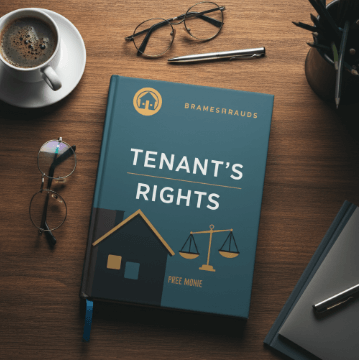Navigating the intricacies of rental agreements can pose a significant challenge, especially when unexpected changes arise, such as a landlord selling a property. This guide aims to delve into the fundamental elements of tenants’ rights when landlord sells property in North Port, Florida. Understanding these rights is crucial for tenants to protect themselves during this transitional period. We will highlight key legal protections and provide practical advice to ensure that tenants are well-informed and empowered in the context of tenants’ rights when landlord sells property in North Port.
Steve Daria and Joleigh, seasoned real estate investors, comprehend the intricacies of the rental market in North Port, Florida. Their experience emphasizes the importance of clear communication between landlords and tenants, particularly during transitions like property sales. By advocating for tenants’ rights, their goal is to cultivate a just and open atmosphere for all individuals engaged in the rental procedure.
What You Should Know About Tenants’ Rights
When the “For Sale” sign goes up, tenants often find themselves in a state of uncertainty.
It’s crucial to understand the basic rules and regulations and tenants’ rights when landlord sells property in North Port, Florida.
This ensures you’re prepared for any situation.
Legal Obligations of Landlords During a Sale of Property
Landlords have specific legal obligations they must fulfill when selling a property.
Notice Period
Typically, landlords are required to give tenants a 30-day notice before the sale of the property.
This notice period allows tenants to prepare for the transition and ensures they are informed about any upcoming changes in property ownership.

Honoring Lease Agreements
Even after a property is sold, existing lease agreements remain legally binding and must be honored by the new owner.
This means that the new landlord is obligated to adhere to the terms and conditions set forth in the lease, providing continuity and stability for the tenants.
Security Deposits
When a property is sold, the landlord must transfer all security deposits held from tenants to the new owner.
This transfer ensures that tenants’ funds are protected and can be returned according to the lease terms and local regulations.
Get An Offer Today, Sell In A Matter Of Days…
Eviction Procedures and Tenant Protections in North Port, Florida
In some cases, new property owners may wish to evict current tenants.
It’s essential to know the legal procedures, eviction process, and protections in place.
Just Cause Eviction
In many jurisdictions, landlords must provide a valid reason for evicting tenants, such as non-payment of rent or significant lease violations.
This requirement is designed to protect tenants from arbitrary or unjust evictions and ensure that there are legitimate grounds for ending the tenancy.
Notice Periods
Landlords are required to give tenants a notice period before proceeding with an eviction, which generally ranges from 30-60 days, subject to local regulations.
This notice period provides tenants with time to address the issues leading to the eviction or to find alternative housing.
Relocation Assistance
Some laws mandate that landlords offer financial assistance or other forms of relocation aid to tenants who are being evicted.
This assistance helps to mitigate the impact of displacement and supports tenants in securing new housing.
Tenant Actions During Property Showings
When a property is up for sale, potential buyers will want to visit and inspect the home.
Tenants need to know their rights during these showings:
- Advance Notice: Landlords must provide reasonable notice before showing the property, usually 24 hours.
- Privacy Rights: Tenants have the authority to privacy and can refuse entry if the notice period isn’t respected.
- Scheduling Visits: Tenants can negotiate convenient times for property showings to minimize disruption.
Impact on Month-to-Month Tenancies
Month-to-month tenants often face more uncertainty during a property sale.
Here’s what you need to know:
- Shorter Notice Periods: Month-to-month tenants may receive shorter notice periods, often 30 days.
- Negotiating with New Owners: Tenants can negotiate new lease terms with the new property owner.
- Ending the Tenancy: Either party can end a month-to-month tenancy with proper notice.
Rent Control and Its Impact
Rent control laws can significantly affect tenants’ rights during a property sale. Here’s how:
- Rent Increases: Rent control laws may limit how much new owners can increase rent.
- Eviction Protections: Tenants in rent-controlled properties often have additional eviction protections.
- Lease Renewal Rights: Rent control laws may give tenants the right to renew their leases under certain conditions.
Best Practices for Communicating with Landlords
Effective communication with landlords can help tenants manage the transition smoothly. Here are some tips:
- Document Everything: Keep a document of all communications with your landlord.
- Request Written Notices: Ask for written notices regarding the sale and any changes to your tenancy.
- Stay Informed: Keep yourself up to date on the sale process and any potential impacts on your tenancy.
Financial Implications for Tenants
Tenants may face financial implications during a property sale. Here’s what to consider:
- Moving Costs: Tenants may need to budget for moving costs if they have to relocate.
- Rent Changes: Be prepared for potential rent changes if the new owner decides to adjust the rent.
- Security Deposit: Ensure that your security deposit is transferred correctly to the new owner.

How to Handle Disputes with Landlords
Disputes with landlords can arise during a property sale. Here’s how to handle them:
- Mediation Services: Consider using mediation services to resolve disputes amicably.
- Legal Advice: Seek legal advice if you believe your rights are being violated.
- Tenant Associations:: Join tenant associations for support and resources.
Tenant Rights Under Federal and State Laws
Understanding federal and state laws is crucial for tenants. Here’s a brief overview:
- Federal Laws: The Fair Housing Act protects tenants from discrimination during the sale process.
- State Laws: State-specific laws provide additional protections, such as notice periods and eviction rules.
- Local Ordinances: Local ordinances may offer further tenant protections.
Role of Real Estate Investors
Real estate investors play a great role in property sales. Here’s what tenants should know:
- Investor Intentions: Investors may have different intentions, such as renovating or redeveloping the property.
- Negotiation Opportunities: Tenants can negotiate lease terms and conditions with investors.
- Long-Term Plans: Understand the investor’s long-term plans for the property to anticipate potential changes.
Community Support and Resources in North Port, Florida
Community support can be invaluable for tenants during a property sale. Here’s where to find help:
- Tenant Advocacy Groups: Join local tenant advocacy groups for support and resources.
- Legal Aid Services: Access legal aid services for assistance with tenant rights issues.
- Housing Resources: Utilize housing resources to find alternative housing if needed.
Conclusion
Understanding tenants’ rights when a landlord sells property in North Port, Florida, is essential for land sellers, property sellers, real estate investors, house buyers, and land buyers. Knowing these rights helps protect tenants from potential disruptions and ensures a smoother transition. Stay informed, communicate effectively, and seek support when needed to safeguard your tenancy during a property sale.
**NOTICE: Please note that the content presented in this post is intended solely for informational and educational purposes. It should not be construed as legal or financial advice or relied upon as a replacement for consultation with a qualified attorney or CPA. For specific guidance on legal or financial matters, readers are encouraged to seek professional assistance from an attorney, CPA, or other appropriate professional regarding the subject matter.

